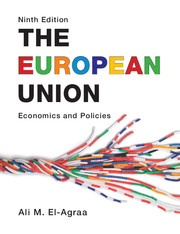Book contents
- Frontmatter
- Contents
- Figures
- Tables
- Boxes
- Contributors
- Preface
- A reader’s guide
- Abbreviations
- 1 General introduction
- Part I EU history, institutions and legal dimension
- Part II EU market integration
- Part III EU monetary integration
- Part IV The single European market
- Part V EU budget and structural policies
- Part VI EU external relations
- External trade policy
- 25 The EU and the developing world
- Part VII The future of the EU
- Bibliography
- Author Index
- Index
- References
25 - The EU and the developing world
from Part VI - EU external relations
- Frontmatter
- Contents
- Figures
- Tables
- Boxes
- Contributors
- Preface
- A reader’s guide
- Abbreviations
- 1 General introduction
- Part I EU history, institutions and legal dimension
- Part II EU market integration
- Part III EU monetary integration
- Part IV The single European market
- Part V EU budget and structural policies
- Part VI EU external relations
- External trade policy
- 25 The EU and the developing world
- Part VII The future of the EU
- Bibliography
- Author Index
- Index
- References
Summary
Introduction
The EU’s economic size and its role in world trade mean that it is a key player in structuring the global economic environment for developing countries (DCs) through its aid and trade policies. EU member states (MSs) are the largest trading partner of DCs, absorbing about one-fifth of their exports in 2009 and accounting for a similar portion of their imports. Also in 2009 the EU and its MSs provided 56 per cent of total official development assistance (ODA) worldwide. Moreover, the EU has a significant indirect influence through its active participation in international organizations that manage the world economic system – for example, the World Bank, the World Trade Organization (WTO) and, before it, the General Agreement on Tariffs and Trade (GATT, managed by the WTO since 1995). Furthermore, the EU development cooperation policy is comprehensive in its approach, including trade arrangements, ODA and political dialogue, with important and even radical changes having been adopted by the EU in 2009 in its development policy. But more significant than all these considerations is that the EU’s relationship with DCs goes back to the time of the creation of the European Economic Community (EEC), when the ex-colonies, especially those of the French, had to be accommodated before the 1957 Rome Treaties could become a reality, with the admission of the UK and the Iberian nations extending and enhancing the Community, to encompass African, Caribbean, Latin American and Asian nations.
This chapter explores the way the EU interacts with DCs through both its trade and its development cooperation policies. It then concentrates on the trade arrangements that are intended to benefit DCs, followed by discussion on the development cooperation or financial aid arrangements. Unfortunately, due to space limitations, other aspects of development aid, such as EU humanitarian or food aid, will not be covered except in passing. The conclusion highlights some of the main issues in the current debates on the EU’s relations with DCs.
- Type
- Chapter
- Information
- The European UnionEconomics and Policies, pp. 401 - 420Publisher: Cambridge University PressPrint publication year: 2011



